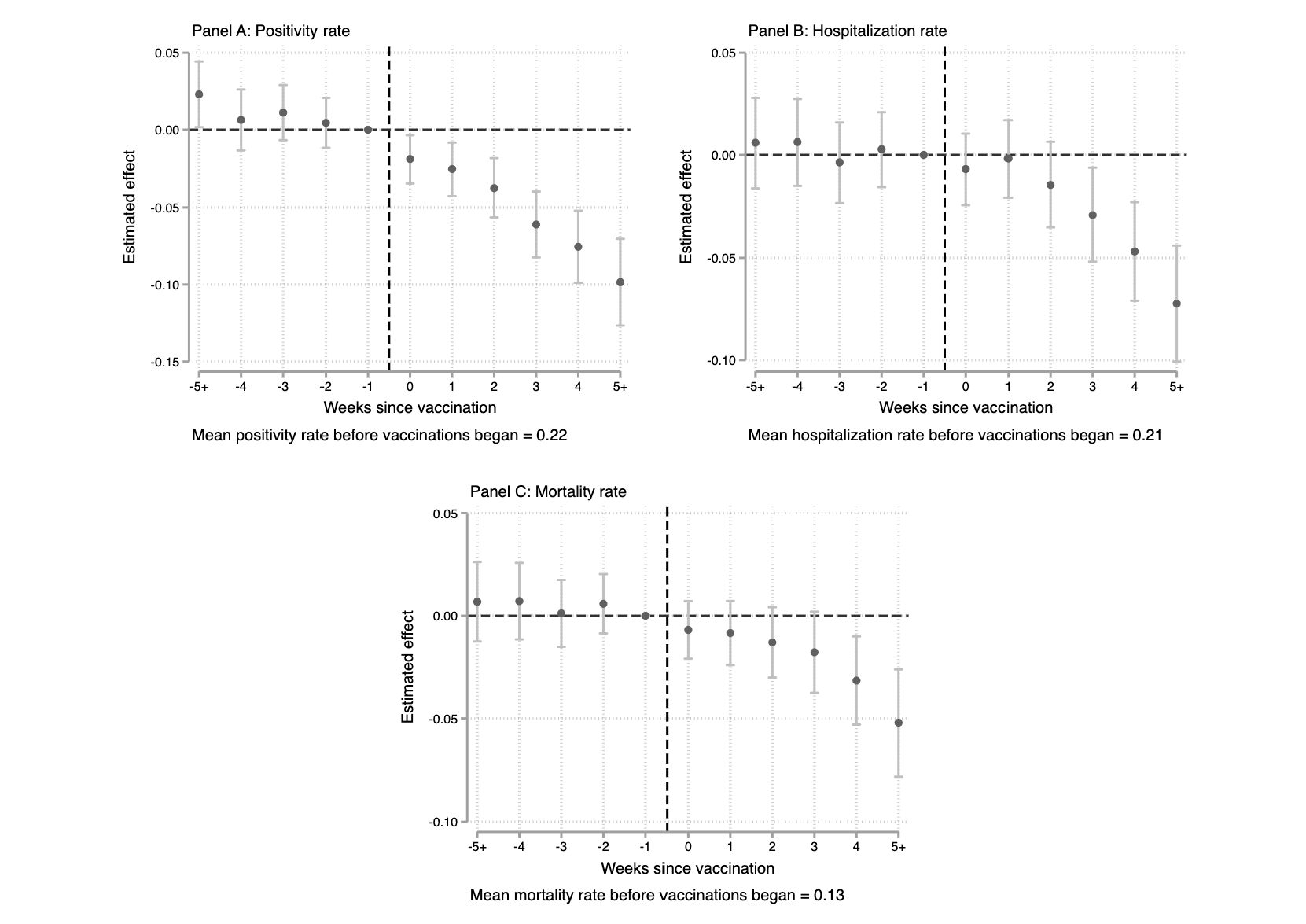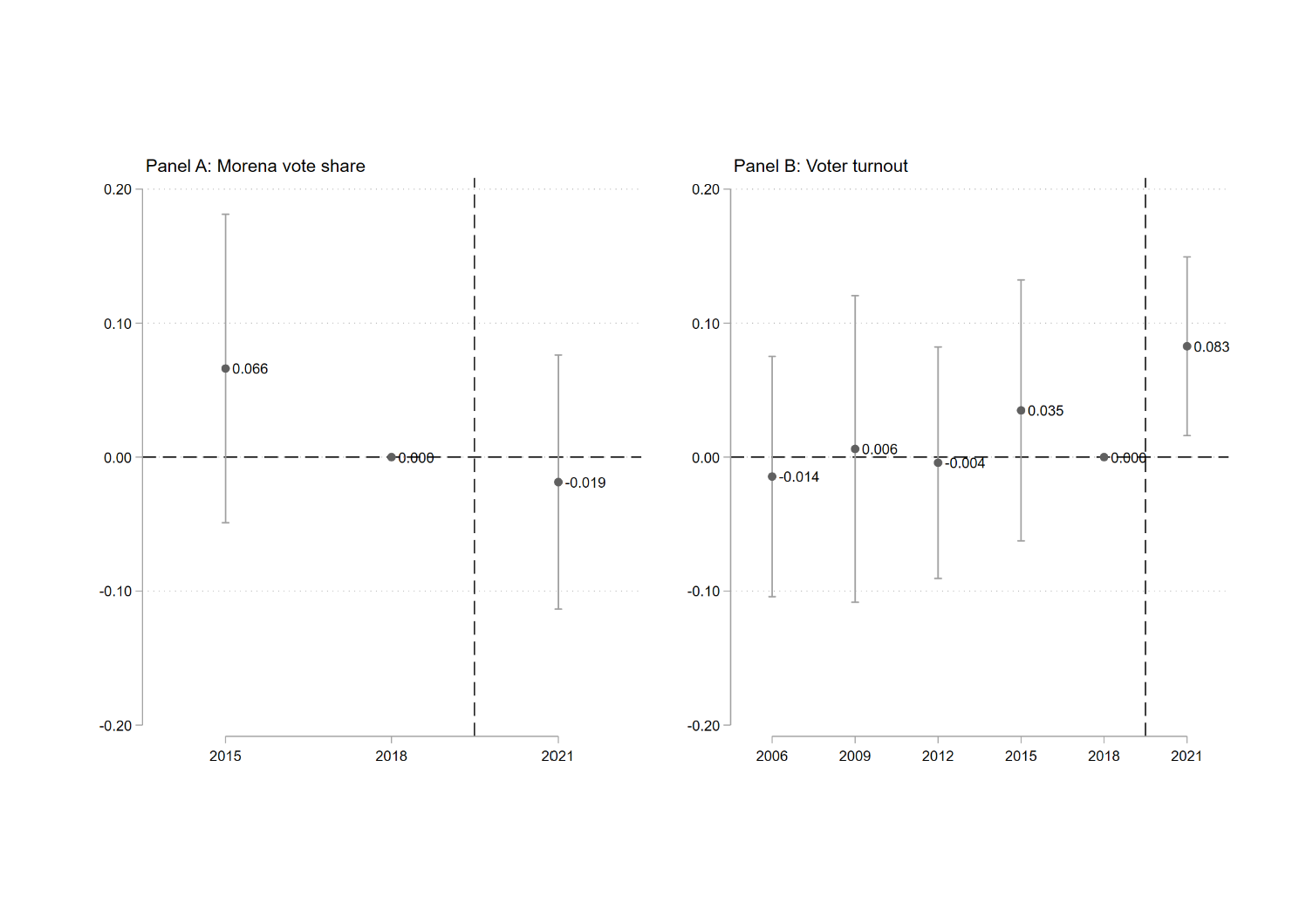Blog
Electoral politics and Mexico’s COVID-19 vaccine roll-out
Government responsiveness is an integral feature of representative democracy. Its importance could be amplified in times of crisis, especially if citizens cannot rely on market actors for help. Governments can soften the impacts of negative shocks to the status quo, or exponentiate them by their inaction or mistakes.
In democracies, one force that steers politicians' choices is the nature of electoral competition. If the electorate rewards or punishes the incumbent's performance against the catastrophe, politicians may have incentive to allocate disaster aid based on electoral gain rather than principles of fairness or equality.
Three questions
We studied the allocation of COVID-19 vaccines in Mexico. The country held a federal election in Summer 2021 while the COVID-19 crisis was still on-going. In this as in other similar contexts, policymakers are faced by complex trade-offs between severe economic loss, effective infection containment, and strategic allocation of vaccine access for their own electoral benefit.
In order to better understand the effectiveness of democracies in fighting pandemics and the political economy of government responsiveness more generally, we analyzed three intertwined questions.
- What were the impacts of the COVID-19 vaccination programme on public health?
- Was the implementation of the programme driven by electoral considerations and to what extent?
- Did the vaccine distribution affect outcomes in the 2021 federal election?
Vaccines work
There has been severe skepticism on the effectiveness of COVID-19 vaccines, to the point of some individuals refusing immunization. Clinical trials confirm their effectiveness, but we are short of community-level evidence. This is a notable gap, as clinical trials cannot account for behavioural responses to vaccines that occur outside the lab, among other factors which may undermine vaccine effectiveness at the population level.
Our first set of findings confirms that vaccines work. We illustrate this in Figure 1. Using data on the advancement of the vaccination campaign scraped from social media and administrative register data on health outcomes, we show that five (and more) weeks after the beginning of vaccine roll-out, the COVID-19 positivity rate, hospitalization rate, and death rate declined by 45, 34, and 40 percent respectively in treated groups relative to the mean before vaccination. This implies that vaccines are a valuable public policy that may improve voter welfare and influence voting behavior.
Figure 1. Effects of vaccine roll-out on COVID-19 outcomes. The graph shows event-study estimates and their 95% confidence intervals. The unit of observation is week-municipality-age group.

What drives vaccine allocation?
The vaccine roll-out was sequenced by municipality and age group. The federal government was solely responsible for the design and implementation of the vaccination campaign, claiming that older citizens at risk of severe infection in poor and marginalized municipalities would be prioritized. This contrasts standard political-economy theories of redistribution which suggest that disadvantaged segments of the society are less likely to receive benefits because they are less likely to influence policy choices, being considered typically less informed and less inclined to vote than their counterparts.
Voter turnout and information are not the only features of electoral competition that could be important. Prominent core voter and swing voter hypotheses suggest that governments either reward those who have supported them in the past, or pursue uncertain voters' votes by targeting redistribution to them. The concerns voiced by government critics during the spring and early summer of 2021 echoed these hypotheses.
We combined information on the vaccine roll-out with electoral and census data to investigate the correlates of vaccine allocation. We found suggestive indication that larger shares of the population were offered the COVID-19 vaccine in municipalities where the ruling party faced tighter electoral competition. Other electoral considerations were less important: for example, voter turnout did not seem to matter. We also did not find evidence that the incumbent targeted areas with a higher concentration of core supporters.
On the other hand, variables that capture voters' level of information, and both population size and age structure —especially the share of the elderly— robustly predicted vaccine allocation. To further understand what matters the most, we adopted a simple machine learning technique. Population variables then appeared to be, by far, the most important determinants of vaccine roll-out. However, this does not imply that electoral competition did not matter in vaccine allocation. It just had a less important role than diverse population characteristics.
Electoral returns to public good provision
Given that (i) the vaccination program had positive effects on health and (ii) there is suggestive evidence that the campaign was at least partially guided by electoral considerations, it is reasonable to ask whether there were any effects on electoral outcomes. To explore the impact of vaccine roll-out on voting behaviour, while holding all time-varying municipality-level factors fixed, we further combined the vaccination data with geographically fine-grained electoral data.
We found that, on average, vaccines were not an electoral booster shot to the governing party. However, we did discover that vaccine roll-out increased voter participation. Figure 2 below illustrates these results.
Figure 2. Effects of vaccine allocation on incumbent vote share and voter turnout. The figure shows dynamic difference-in-differences estimates and their 95% confidence intervals.

Closing remarks
Countries around the world held elections in the midst of the COVID-19 pandemic. In many of these elections, we witnessed a decline in electoral participation. It is plausible that the pandemic undermined voter turnout. Our results indicate that these negative effects could be, at least partially, mitigated by vaccination.
Altogether, our findings have broader implications for how electoral politics shape government responsiveness. Understanding what drives governments to protect their citizens in times of a crisis and beyond is also a key issue for good institutional design.
You can read more about our research here.
Emilio Gutiérrez is a Professor of Economics at the Department of Economics at ITAM in Mexico City. His research focuses on Applied Microeconomics, in particular on Development Economics and Health Economics.
Jaakko Meriläinen is an Assistant Professor of Economics at the Department of Economics and the Centro de Investigación Económica at ITAM in Mexico City. He is broadly interested in the nature of democratic governance, and economic and political development.
Antonio M. Ponce de León is an MSc Student at the Department of Economics at ITAM in Mexico City. He studies questions in the intersection of Political and Development Economics.
The views expressed in this piece are those of the author(s), and do not necessarily reflect the views of the Institute or the United Nations University, nor the programme/project donors.
 Join the network
Join the network










